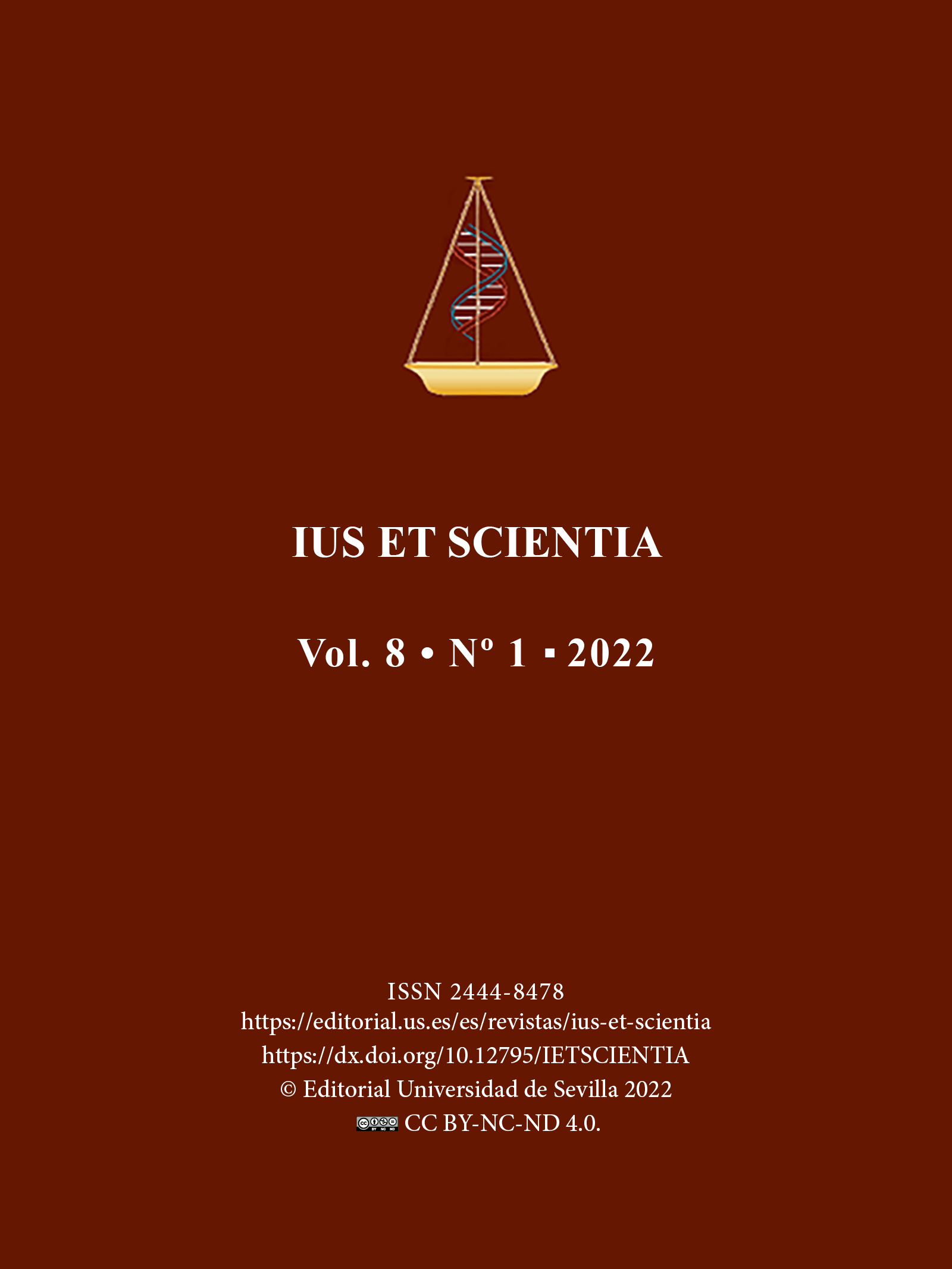Among citizen trust and technological impulse. Legal challenges of Artificial Intelligence in light of the EU regulation proposal
DOI:
https://doi.org/10.12795/IETSCIENTIA.2022.i01.11Keywords:
Artificial Intelligence, New regulation, Fundamental rights, IA risksAbstract
While the approach to the disappearance of Artificial Intelligence from everyday life does not proceed, neither is the combination of technological impulse and citizen trust questioned within the framework of the European Union. It is clear that this composition of apparently antithetical elements entails serious difficulties for its development and growth in an integral way. To establish sustainable bridges and promoters of progress, the EU created a proposal for an Artificial Intelligence Regulation whose dogmatic basis is that AI must be an instrument for people and a positive force in a society whose ultimate goal must be to increase human well-being. It is for this reason that citizen trust is not a possibility but an obligation to which the Union is committed while striving to create the ideal ecosystem for technological and scientific progress.
Downloads
References
Comisión Europea, Dirección General de Redes de Comunicación, Contenido y Tecnologías, (2019). Directrices éticas para una IA fiable, Oficina de Publicaciones. https://data.europa.eu/doi/10.2759/14078
Comisión Europea, Prensa. Comunicado oficial. Inteligencia artificial: La Comisión continúa su trabajo sobre directrices éticas. 8 de abril de 2019. Bruselas. Recuperado el 5 de diciembre de 2021 de: https://ec.europa.eu/commission/presscorner/detail/es/IP_19_1893.
Comisión Europea, Prensa. Comunicado oficial. Un nuevo enfoque para permitir que las normas de la UE desempeñen un papel de liderazgo en la promoción de valores y de un mercado único resiliente, ecológico y digital. 2 de febrero de 2022. Recuperado el 8 de junio de 2022 de: https://ec.europa.eu/commission/presscorner/detail/es/ip_22_661.
Comisión Europea, Comunicación De La Comisión Al Parlamento Europeo, Al Consejo, Al Comité Económico Y Social Europeo Y Al Comité De Las Regiones, (21 de abril de 2021) Fomentar un enfoque europeo de la inteligencia artificial. Recuperado de: https://s3platform.jrc.ec.europa.eu/documents/portlet_file_entry/20125/Communication+on+Fostering+a+European+approach+to+Artificial+Intelligence+21.04.2021.pdf/d50e763c-9976-c21e-834d-70dcbef6bbc8
Comisión Europea, Comunicación De La Comisión Al Parlamento Europeo, Al Consejo, Al Comité Económico y Social Europeo y Al Comité De Las Regiones. 19 De Febrero De 2020. Una Estrategia Europea de Datos. COM/2020/66 final. Recuperada de: https://eur-lex.europa.eu/legal-content/ES/TXT/?uri=CELEX%3A52020DC0066
Directiva 2019/1024 del Parlamento Europeo y del Consejo, de 20 de junio de 2019, relativa a los datos abiertos y la reutilización de la información del sector público. Diario Oficial de la Unión Europea L 172/56. 26 de junio de 2019. Págs 1-28.
Propuesta de Reglamento Del Parlamento Europeo y Del Consejo relativo a la gobernanza europea de datos (Ley de Gobernanza de Datos). 25 de noviembre de 2020. COM/2020/767 final, 2020/0340 (COD). Recuperado de: https://eur-lex.europa.eu/legal-content/ES/TXT/PDF/?uri=CELEX:52020PC0767&from=ES
ENGUIX OLIVER, S., (2017), “Impacto político e informativo de las redes sociales: esferas de actuación y comparación con los medios”. Anàlisi. Quaderns de Comunicació i Cultura, 56, 71-85.
GELPI TEXEIRA, R., (2018), “Política 2.0: las redes sociales (Facebook y Twitter) como instrumento de comunicación política”. Tesis Doctoral. Universidad Complutense De Madrid.
HERNÁNDEZ PEÑA, J.C., (2020) “Decisiones Algoritmicas De Perfilado: Regimen y Garantias Juridicas”., Revista española de Derecho Administrativo. 203 Enero - Marzo 2020 Págs. 281 – 322.
Business Insider, (25 sep. 2020) “Un exejecutivo de Facebook asegura que lo crearon para ser “tan adictivo como el tabaco” y ahora teme que por ello EEUU pueda estar “al borde de una guerra civil””. Recuperado el 8 de diciembre de 2021 en: https://www.businessinsider.es/facebook-diseno-ser-adictivo-como-tabaco-exejecutivo-724243.
Innerarity, D. y Colomina, (2020) C. “La verdad en las democracias algorítmicas”. Revista CIDOB d’Afers Internacionals, n.o 124, págs. 11-23.
Parlamento Europeo, Noticias Parlamento Europeo, sección Sociedad. (04-05-2022 ) “Regulación de la inteligencia artificial en la UE” Recuperado el 23 de noviembre de 2021 de: https://www.europarl.europa.eu/news/es/headlines/society/20201015STO89417/regulacion-de-lainteligencia-artificial-en-la-ue-la-propuesta-del-parlamento.
Propuesta Reglamento Del Parlamento Europeo y del Consejo por el que se establecen Normas Armonizadas en materia de Inteligencia Artificial (Ley De Inteligencia Artificial) y se modifican determinados Actos Legislativos de la Unión. Bruselas, de 21 de abril de 2021, COM(2021) 206 final. Recuperada de: https://eur-lex.europa.eu/resource.html?uri=cellar:e0649735-a372-11eb-9585-01aa75ed71a1.0008.02/DOC_1&format=PDF
Reglamento (UE) 2016/679 Del Parlamento Europeo y Del Consejo. De 27 De Abril De 2016. relativo a la protección de las personas físicas en lo que respecta al tratamiento de datos personales y a la libre circulación de estos datos y por el que se deroga la Directiva 95/46/CE (Reglamento general de protección de datos). Diario Oficial de la Unión Europea L 119/. Recuperada de: https://www.boe.es/doue/2016/119/L00001-00088.pdf
RUSSELL, S. J.; NORVIG, P., (2004), Inteligencia Artificial. Un enfoque moderno., 2a edición., Pearson Educación S.A., Madrid.
Published
How to Cite
Issue
Section
License
Copyright (c) 2022 María Verónica Vargas

This work is licensed under a Creative Commons Attribution-NonCommercial-ShareAlike 4.0 International License.
Those authors being published in this journal agree to the following terms:
- Authors retain their copyright and they will guarantee to the journal the right of first publication of their work, which will be simultaneously subject to license recognition by Creative Commons that allows others to share such work provided it is stated the author’s name and his first publishing in IUS ET SCIENTIA.
- Authors may take other non-exclusive distribution license agreements version of the published work (e.g. deposit in an institutional digital file or publish it in a monographic volume) provided it is stated the initial publication in this journal.
- It is allowed and encouraged that Author s disseminate their work via the Internet (e. g. institutional digital files or on their website) prior to and during the submission process, which can lead to interesting exchanges and to increase citation of the published work.
- Abstract 353
- PDF (Español (España)) 193
- HTML (Español (España)) 59





